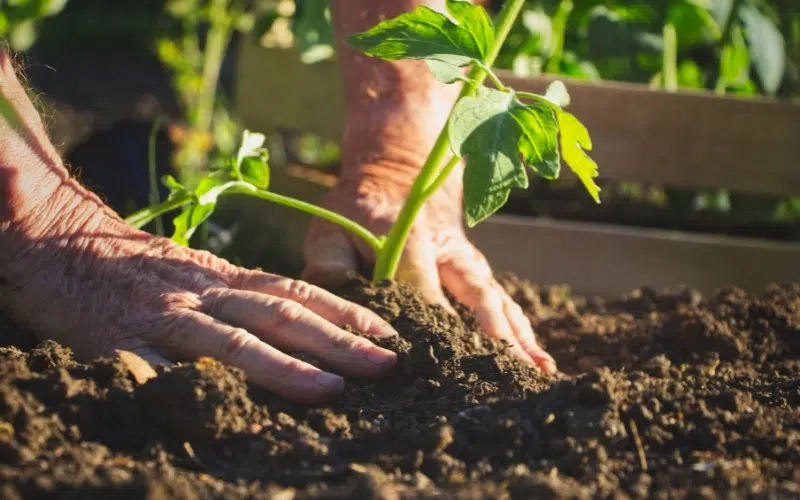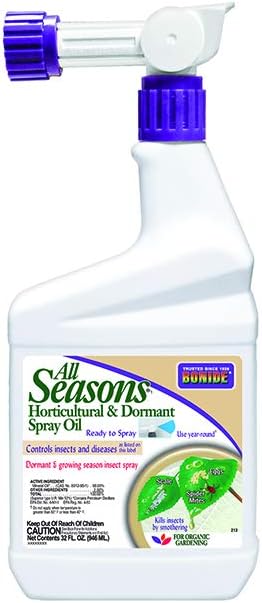There is nothing quite like growing your own food. But the excitement can quickly wear off once you start seeing bugs and pests destroying your plants.
You want to get rid of these pests, but you don’t want to contaminate your food with harsh chemicals either. Thankfully, there are methods you can use that work for organic gardening.
The Best Organic Insecticides for Your Vegetable Garden
1. Diatomaceous Earth
This is one of my favorite organic methods for keeping pests at bay. You can use it to help with a bunch of insects and pests that might eat the leaves or fruit of your plants, and it’s non-toxic!
It’s made of crushed up shells and fossilized remains of oceanic organisms. The shells are ground up so finely that they get into the skeleton of pests and make it super uncomfortable for them to be around.
It sounds gross, but diatomaceous earth dries out insects by absorbing the oils/fats from their exoskeleton, making it one of the more effective insect killers.
I always buy the food-grade version because they have to go through a few more hoops to make it safe for your vegetable garden.
What Does Diatomaceous Earth Get Rid of?
Diatomaceous earth can help keep all kinds of different pests away, including:
- Aphids
- Squash bugs
- Beetles
- Hornworms
- Ants
- Spider Mites
- Japanese Beetles
How to Apply It
Note: Make sure to wear protective goggles and a face mask as this stuff is very fine and can irritate your eyes and mouth.
Water your plants deep enough that you can skip a few days. You’ll also want to check the weather to make sure you aren’t doing this on the hottest day of the year.
If you water your plants right after applying this, it’s going to get washed away and not be as effective.
Using a duster bottle or your hand, sprinkle it on your vegetable garden plants and leaves after they’ve been watered (and have had a little time to dry off).
While it may not kill every kind of pest, it will make the environment so uncomfortable for them that they won’t be coming back anytime soon. Japanese beetles and bean beetles especially hate this stuff because it gets under adult insects’ wings and makes it hard to move and fly.
2. Neem Oil
Neem oil is a naturally occurring oil that comes from neem tree seeds. Neem trees are native to India and South Asian countries, so you might not have heard of these before.
This insecticide is completely organic and safe to use on your plants to get rid of almost any soft-bodied insect.
What Does Neem Oil Get Rid of?
Neem oil works to help repel:
- Aphids
- Whiteflies
- Snails
- Mealybugs
- Cabbage worms
- Fungus gnats
- Flies
- Mosquitoes
- And lots of other pests!
If you’re going to be eating the leaves of the plants, you want to keep in mind that neem oil can leave some bitter taste behind.
How to Apply Neem Oil
You can make a mixture of 1 ounce of neem oil extract/concentrate per gallon of water. Then you can use a spray bottle or garden hose attachment to spray all plant surfaces (top and bottom of leaves) until they are wet.
Here is a great garden-safe neem oil to try out. While it often comes in larger sizes, you’ll want quite a bit of this once you see how well it works 🙂
I love this stuff and use it to keep all kind of pests from ruining my tomatoes, peppers and other plants.
3. Oil Sprays
Oil sprays are another great option for insecticides in vegetable gardens. The oils end up clogging soft-bodied insects and make it hard for them to move.
What Do Oil Sprays Repel?
Oil sprays can kill insects like:
- Aphids
- Worms
- Moths
- Leafhoppers
- Spider mites
- Whiteflies
- Mealybugs
- Squash bugs
Bonide Horticultural Spray
This is a type of “paraffinic” oil insecticide spray that may be used during the growing season but also helps act as a dormant spray to control overwintering insect eggs. It’s great to use on fruit trees and ornamental plants as well.
4. Spinosad Sprays
Spinosads are really good insect killers that are also non-toxic to the plants in your garden.
A brand called Monterey makes a great variety of insect killers that is OMRI listed organic and non-toxic for humans and animals. This spray is made through fermentation but magically doesn’t produce any odors. I was expecting this to smell a lot but it doesn’t really.
This product is said to work well on a variety of garden pests like caterpillars, leafminers, codling moths, tent caterpillars, gypsy moths, trips, borers, fire ants, and more.
How to Make Your Own DIY Insecticide
As gardeners, we often love figuring out ways to make something yourself instead of buying it from the store. For those of you who want to make your own insecticide, here are a few ideas.
5. Garlic Spray
This one is my favorite!
If you’ve ever heard of companion planting, this idea will make complete sense to you. Garlic is known as a great companion plant for many herbs and vegetables because it helps repel insects like tomato hornworms, aphids, and beetles which impact a lot of vegetable gardens.
The Mixture:
- 10-15 garlic cloves
- 1 quart of water
- 4-5 drops of liquid dish soap (organic/all natural is best)
Puree the garlic and then strain this out a bit if you can so you don’t clog up the nozzle of your spray bottle.
Once it’s in the spray bottle, go ahead and add the dish soap and water to it and you’re ready to spray it on any plants having trouble with insects in your vegetable garden.
6. Chili Pepper Spray
If you’re having trouble with deer, rabbits, and squirrels as well as insects in your vegetable garden, this one is a great option.
Because of the capsaicin in hot peppers, they are great at repelling insects and larger animals as well.
Insects it helps control: aphids, spider mites, whiteflies, cabbage loopers, beet worms, leafhoppers, and other soft-bodied insects. Chile pepper spray will also help with squirrels and rabbits, as well as the occasional deer.
The Mixture:
- 5-7 hot peppers
- 1 tablespoon of dish soap (non-detergent)
- 1 tablespoon of vegetable or mineral oil
- 3/4-1 gallon of water
Throw all of that in a blender and you are ready to go!
Bonus: Add 6-10 cloves of garlic to the spray to get the benefits of the garlic spray mentioned above.
7. Liquid Soap Spray
If you don’t have chili peppers or garlic laying around, you can use a mixture of liquid soap with water instead. It will help repel aphids, whiteflies, spider mites, and a few other insects in your vegetable garden.
Just be careful because spraying too much soap on your plants can dry out the leaves and stress the plant.
The Mixture:
- 2 teaspoons of non-detergent dish soap
- 1 quart of water

Types of Pest Control Methods
There are many different types of pest control, so let’s walk through each so you understand what you’re bringing into the garden.
Pesticides
Pesticides may be used to kill insects, snails, and slugs. These work when the insects ingest them but also when they come into contact with pesticides. Some of these work right away, while others are more effective over a bit of time.
Insecticides
Insecticides are a type of pesticide and are used to target and kill specific insects, like wasp spray, ant killer, and snail bait. These include broad-spectrum insecticides as well.
Spinosads
A spinosad is a type of insecticide that is very toxic to insects, but safe for most everything else.
Spinosad is “a mixture of two chemicals called spinosyn A and spinosyn D” and are used to help control a variety of insects and pests like fruit flies, ants, mosquitoes, thrips, and leafminers.
Pyrethrin
Pyrethrin is a kind of insecticide that comes from flowers. Because it is a natural product, it is generally safe to use in a garden and on edible plants. Pyrethrin is great for killing ants, aphids, caterpillars, fleas, and wasps.
Organic Insecticides (Botanical)
These are kind of best insecticides and natural targeted insecticides that are not harmful to humans or the environment. Because you are trying to keep pests off of the food you’re growing to eat, this is a natural choice for many (pun intended).
Getting the Best Results
While there are plenty of chemical and toxic options out there, you’re going to be eating the plants and fruits/vegetables from your garden so keep that in mind.
There are a lot of great organic options with non-toxic active ingredients and they’re easy to use as garden insect killers and deterrents.





